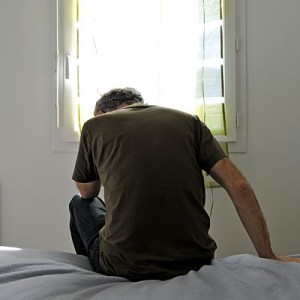 A number of my over 40 aged male patients have come to me with concerns that they just don’t feel right but can’t quite put their finger on what exactly is wrong. They have a hard time sleeping, no energy, don’t enjoy friends or relationships like they used to, don’t feel like doing much and just slug through their day, not really feeling sick, but just feeling, like one of my patients describes, “underwater”.
A number of my over 40 aged male patients have come to me with concerns that they just don’t feel right but can’t quite put their finger on what exactly is wrong. They have a hard time sleeping, no energy, don’t enjoy friends or relationships like they used to, don’t feel like doing much and just slug through their day, not really feeling sick, but just feeling, like one of my patients describes, “underwater”.
When I tell these male patients that they may be suffering from depression, they’re surprised, and, as one man said, ‘I thought depression was a woman thing.’ Depression is also a guy thing too. In fact, it’s a common condition that can hit men over the age of 40, especially as they get closer to their 50s and 60s. Read what I tell my male patients about depression, what might be causing it and what they can do about it.
Symptoms of Depression in Men
There are differences in male and female depression, however, mostly in the way the depression is expressed which is why depression in men is often missed as a diagnosis. Women are typically more verbal and expressive of their feelings than men and will often talk about the emotional, or mental aspects of depression such as feelings of sadness, loneliness, and low self-esteem.
Men, on the other hand, especially of the older generations, may either push their bad feelings away or not deal with them at all. Men tend to transfer their depressed feelings to their physical selves and complain of more physical-based symptoms, like headaches, tiredness, stomachaches, and even chest pain. However, they can also start to “act out” and express depression outwardly as anxiety, anger, hostility and/or aggressiveness towards themselves, others or even property. Here are some common signs of depression in men:
- Chronic tiredness – sleeping more.
- Decreased sexual desire, poor performance.
- Increased aggressiveness – getting into verbal or physical fights with people; destroying property.
- Increased drinking or using drugs, gambling, and other risky behavior.
Some Causes of Depression in Men
When a male patient comes into my office complaining of certain symptoms and/or appearing to be depressed, the first thing I do is rule out any physical causes. The first one would be his testosterone levels. Just as depression in women can be aggravated/caused by hormonal changes at a certain age, the same thing can happen in men. If I find that his T-levels are normal, I look at a few other possible physical causes like these:
- Nutritional deficiencies: Low B12, and other B vitamins, can be the culprit behind depression, low energy and persistent irritability. Also, low potassium, low blood sugar, food sensitivities, low folate levels can cause depression.
- Dehydration. Listlessness, brain fog and depression can result from dehydration.
- Underlying disease. Undiagnosed medical conditions like low thyroid or diabetes, insomnia, low blood pressure, heart/circulation problems, stroke, can cause depression.
- Medications. Long-term use of certain prescribed and over-the-counter medications may have the side effects of depression and/or the symptoms associated with it. These include statins for high cholesterol, and drugs for other conditions such as acne, cortisone, Parkinson’s, and sinus.
Once I’ve ruled out possible physical causes for depression, I look at social issues, which can include the following:
- Loss of job/lowered income: Especially in today’s slow economy, many men have lost their jobs, had their income reduced, or have been forced into an early retirement. This can undermine self-esteem and security in a man’s ability to take care of his family in addition to the loss of his daily routine that can leave him feeling ungrounded.
- Loss: Either through death of a family member, divorce, relocation, or loss of significant others in a man’s life can cause him to feel unsettled, resulting in depression.
What Can You Do About Your Depression?
The good news is that, according to the National Institute of Mental Health, 80% of depressed people are successfully treated. If you experience feelings of depression, here’s what to do:
- First, consult your doctor who can rule out any underlying physical causes.
- Second, get a referral to a counselor, psychologist, or psychiatrist who can help you sort through upsetting and confusing lifestyle changes. These can be found through your doctor, your church, friends, community services, employee assistance programs.
- Third, don’t go it alone. Let a friend or family member know that you are seeking help with depression so they can check in on you and offer support.
- If your depression feels so overwhelming that suicidal thoughts have crossed your mind, call 9-1-1 immediately or get yourself to a walk-in crisis center at the nearest hospital. According to statistics, first suicide attempts are more successful in men than women.
Depression, in men or women, is a condition that should never be ignored. It can have serious personal and social consequences and just make you feel plain lousy. If you feel you are suffering from symptoms of depression, talk to your doctor who can rule out any possible physical causes. Next, talk to someone else, your spouse, a family member, a friend. Remember, the load can get a whole lot lighter if you allow someone else to help you carry it.
Stay Well,
Mark Rosenberg, M.D.
Depression in Men, http://www.webmd.com/depression/depression-men?page=2
Vitamin Deficiencies and Depression, http://depression.about.com/cs/diet/a/vitamin.htm
